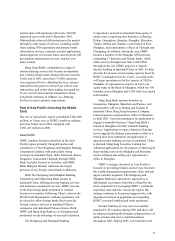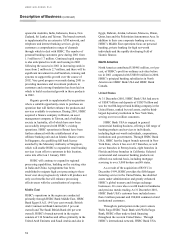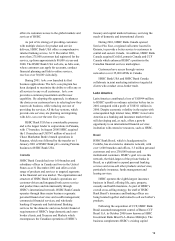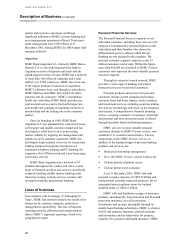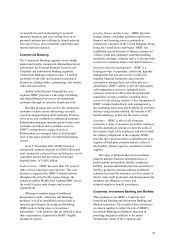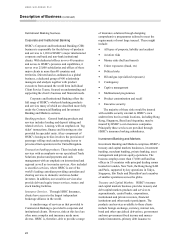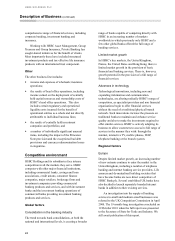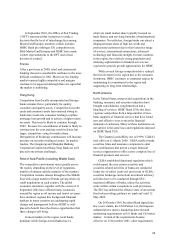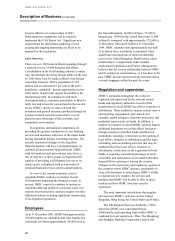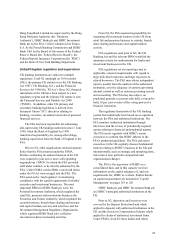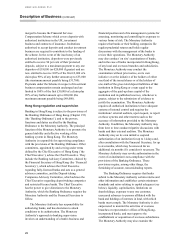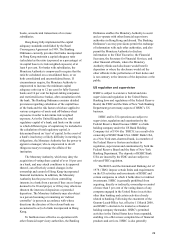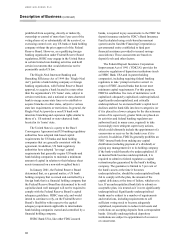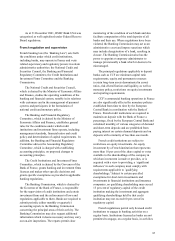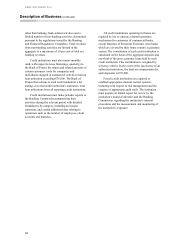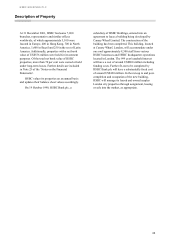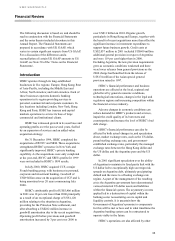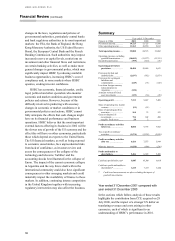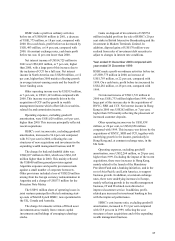HSBC 2001 Annual Report Download - page 29
Download and view the complete annual report
Please find page 29 of the 2001 HSBC annual report below. You can navigate through the pages in the report by either clicking on the pages listed below, or by using the keyword search tool below to find specific information within the annual report.27
Hang Seng Bank Limited are supervised by the Hong
Kong Monetary Authority (the ‘Monetary
Authority’ ), HSBC Bank plc and HSBC Investment
Bank plc by the FSA, Crédit Commercial de France
S.A. by the French Banking Commission and HSBC
Bank USA by the Board of Governors of the Federal
Reserve Board (the ‘Federal Reserve Board’ ), the
Federal Deposit Insurance Corporation (the ‘FDIC’ )
and the State of New York Banking Department.
United Kingdom regulation and supervision
UK banking institutions are subject to multiple
regulations. Until N2 (midnight on 30 November
2001), the primary UK statutes were the UK Banking
Act 1987 (‘UK Banking Act’ ), and the Financial
Services Act 1986 (the ‘FS Act’ ). Since N2, financial
institutions in the UK have been subject to a new
regulatory regime and the primary UK statute is now
the Financial Services and Markets Act 2000
(‘FSMA’ ). In addition, other UK primary and
secondary banking legislation is derived from
European Union (‘EU’ ) directives relating to
banking, securities, investment and sales of personal
financial services.
The FSA has been responsible for authorising
and supervising UK banking institutions since 1 June
1998, when the Bank of England Act 1998
transferred responsibility for, among other things,
banking supervision from the Bank of England to the
FSA.
Prior to N2, other organisations retained separate
duties that the FSA assumed under the FSMA.
Entities conducting investment business in the UK
were required to join one or more self-regulating
organisations (‘SROs’ ) to which the FSA provided
staff under contract, or be directly authorised by the
FSA. Under FSMA certain SROs vested with duties
under the FS Act were merged into the FSA. The
FSA acted as the ‘lead regulator’ in monitoring
compliance with the capital requirements for banks’
securities and investment businesses. The most
important SROs for HSBC Bank plc were: the
Personal Investment Authority, which regulated the
retail life, pensions and investments business; the
Securities and Futures Authority, which regulated the
custody business, branch share dealing and treasury
and capital markets services and activities; and the
Investment Management Regulatory Organisation,
which regulated HSBC Bank plc’ s collective
investment scheme trusteeship activities.
From N2, the FSA assumed responsibility for
regulating all investment business in the UK from
retail life and pensions business to custody, branch
share dealing and treasury and capital markets
activity.
FSA regulations (and prior to N2, the UK
Banking Act and the relevant SROs) establish the
minimum criteria for authorisation for banks and
investment businesses in the UK.
FSA regulations set out reporting (and, as
applicable, consent) requirements with regard to
large individual exposures and large exposures to
related borrowers. The FSA may obtain independent
reports, usually from the auditors of the authorised
institution, as to the adequacy of systems governing
internal control as well as systems governing records
and accounting. The FSA may also object, on
prudential grounds, to persons who hold, or intend to
hold, 10 per cent or more of the voting power of a
financial institution.
The regulatory framework of the UK banking
system has traditionally been based on co-operation
between the FSA and authorised institutions. The
FSA monitors authorised institutions through
interviews and the review of periodically required
reports relating to financial and prudential matters.
The FSA meets regularly with HSBC’s senior
executives to confirm that HSBC adheres to the
FSA’s prudential guidelines. The FSA and senior
executives in the UK regularly discuss fundamental
matters relating to HSBC’s business in the UK and
internationally, such as strategic and operating plans,
risk control, loan portfolio composition and
organisational changes.
The FSA is the supervisor of HSBC on a
consolidated basis and in this capacity receives
information on the capital adequacy of, and sets
requirements for, HSBC as a whole. Further details
on capital measurement are included in ‘Capital
Management’ on pages 118 to 120.
HSBC Bank plc and HSBC Investment Bank plc
are HSBC’s principal authorised institutions in the
UK.
Prior to N2, depositors and investors were
covered by the Deposit Protection Fund which
applied to deposits with authorised institutions in the
UK and the Investors Compensation Scheme which
applied to clients of authorised investment firms.
Under FSMA, from N2 these bodies and others


